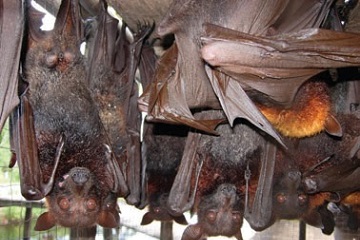Professor of IPB Revealed Fruit Bats in Indonesia Potentially Zoonotic

Professor of the Faculty of Veterinary Medicine (FKH), Bogor Agricultural University (IPB), Prof. drh. Ekowati Handharyani, PhD, APVet, found several potential zoonotic pathogens in fruit bats in Indonesia. "The pathogen is the organism carrying/causing diseases. The diseases carried by pathogen with zoonotic potential may be transmitted from animals to humans, "said Prof. Ekowati.
Prof. Ekowati conducted research on bat in Indonesia since 2010. Prof. Ekowati devoted to IPB since 1979 is focused on fruit eaters large bats. Her research reported that there are several virus type-pathogens carried by bats. However, in spite of causing diseases in bat, the virus type-pathogens are identified can be transmitted to humans.
Indonesia has about a thousand species of bats, ranging from large and small bats, fruit-eaters and insectivorous eaters. The interaction between people and bats is still high, especially in some areas in Indonesia such as Sulawesi, West Sumatra, West Java and East Nusa Tenggara. Bats are usually hunted for sell or consumption.
"For direct consumption purposes, the pathogen hosted in bat will die a few hours after the bat die. However, people's interaction is not just when the bat dies, but also when the animal is still alive. So in handling this animal, we still have to be careful since the transmission of the disease can be through urine bat and saliva, "she explained.
Of the four areas studied, the potentially zoonotic pathogen virus was found in bats originated from Sulawesi and West Java. The types of virus found were nipah and mold or fungi. Both of these viruses usually infect the liver. If transmitted to human, both viruses will cause brain inflammation and pneumonia.
The high risk of the diseases makes Prof. Ekowati encourage the community to be more careful in maintaining closeness with bats, especially for people with high interaction intensity with this animal. She also hopes that there will be follow-ups from concerned parties to conduct health socialization to the people who often interact with bats. (TK)



